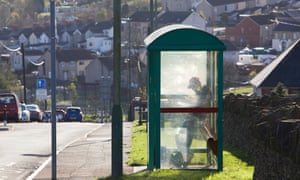
As descriptions of capitalism go, it’s surely one of the best ever written: poetic, urgent, and as much to do with metaphysics as economics. According to the Communist Manifesto: “Constant revolutionising of production, uninterrupted disturbance of all social conditions, everlasting uncertainty and agitation distinguish the bourgeois epoch from all earlier ones. All fixed, fast-frozen relations, with their train of ancient and venerable prejudices and opinions, are swept away, all new-formed ones become antiquated before they can ossify.” And then the kicker: “All that is solid melts into air.”
Whatever their shortcomings as revolutionaries and futurologists, Marx and Engels’ vision of ceaselessly changing economies and societies seems just as pertinent now as it did 169 years ago, with one particularly surreal caveat.
Most traditional conceptions of capitalism have been founded in some notion of material stuff: physical property, premises, machinery, goods. But the companies at the forefront of the 21st-century economy have a very different way of operating, as evidenced by one of the year’s most talked-about books. It has a title that, somewhere in the socialist hereafter, must have been greeted with mirth by the ghosts of Karl and Fred. Written by the economist Jonathan Haskel and the innovation researcher Stian Westlake, Capitalism Without Capital may sound like a riddle but actually makes perfect sense.
Airbnb has revolutionised the market in accommodation but owns no property. Chinese online giant Alibaba is reckoned to be the world’s biggest retailer but holds no stock. Neither does that byword for modern shopping, eBay. Meanwhile, Uber has arrived to upturn personal transport but owns no cars.
Such are the strange ways of what is becoming known as platform capitalism: a model which took a shift that had been under way since the 1970s to its logical conclusion. Cutting-edge capitalism is increasingly weightless. What makes the difference between winners and losers is not physical things, but such quicksilver commodities as ideas, knowledge, research, software, brands, networks and relationships.
Haskel and Westlake centre their story on a shift in investment, away from “tangible” assets to these “intangible” items. In the United States, the share of GDP devoted to the latter is reckoned to have overtaken the former in the mid-1990s; in the UK, the watershed was reached towards the end of that decade. In other countries – Italy and Spain, for instance – investing in old-fashioned kit and plant still takes precedence. But in all the statistics there is a clear implication: that as we head into the future, intangibles will rule.
This cuts across many of the usual laws and expectations of economics. Physical assets, in any crude understanding, can be bought and sold. But intangibles are much more difficult entities. As the authors say: “Toyota invests millions in its lean production systems, but it would be impossible to separate these investments from their factories and somehow sell them off.”
Intangible assets are open to “spillovers”: the tendency of ideas and innovations to spread, often way beyond the intentions of their inventors. As part of the same process, they tend to have synergies with each other, often unexpectedly: “The MP3 protocol, combined with the miniaturised hard disk and Apple’s design skills, created the iPod, a very valuable innovation.”
And, liberated from any dependence on a fixed stock of machinery, the creations of these intangible assets can spread at speed, and quickly dominate their field – which is why Uber has become inescapable in less than a decade and 13 years after Facebook’s launch, Mark Zuckerberg’s social network is central to the lives of a quarter of humanity.
The world, then, changes quickly. The physical production that companies still need is increasingly both outsourced to distant, low-wage countries and automated. Even employment in what we think of as “services” is looking alarmingly vulnerable to robotics and artificial intelligence. Meanwhile, intangibles dominate not just the business world but our everyday lives. From music through books to cars, the centrality of physical stuff is dwindling away.
So an inevitable question arises: in economies and societies in which the intangible is king, and having a specific skill tied to a particular activity seems much less valuable than a generalised set of attributes, who will prosper? And who is in danger of sinking?
As Haskel and Westlake see it, the future belongs to people who can thrive in an ethereal, unpredictable world, and endlessly adapt – “product managers, lawyers, business development people, design engineers, marketers, head-hunters, and so forth”. Or, put another way, “people who combine decent data-analytical skills with the soft skills needed to broker relationships inside and outside their own company”.
These people cluster in cities – where, as evidenced by the increasingly costly London, New York and San Francisco, their ever-increasing presence is pushing up property prices. The fact that their mixture of aptitudes can easily seem rare often fosters a “cult of talent” that pushes their pay into the stratosphere. They move to urban areas, partly in pursuit of the kind of “synergies” and “spillovers” mentioned above, and network their heads off.
Extend the notion of intangibles into questions of culture, and you have a key to what is unsettling western societies
The old world is a factory canteen in a company town, full of harried workers keeping their heads down before they graft on a production line; the new reality is symbolised by a street-corner coffee shop full of people answerable to a mixture of employers, who may be either working or socialising, or both.
I know this tribe of people increasingly well. Around a month ago, I spent an afternoon at the tech division of the insurance giant Aviva, housed in what it calls a “digital garage”. The first person I met was the twentysomething who had recently designed all the visual aspects of its websites and apps, and came not from the world of financial services, but the games company Activision.
A few yards away, some of his colleagues were working on a classic example of spillover and synergy, perfecting software that will allow people to access spoken financial advice via the Amazon Echo. That week, they were working in insurance. The next, they might be bringing their talents to a completely different part of the economy.
Obviously, not everybody is like that. And as consistent work involving physical stuff increasingly falls away, it seems the clash between two very different kinds of people will characterise the painful birth pangs of a new reality.
In a frustratingly brief section of the book, Haskel and Westlake tentatively put Brexit and the election of Donald Trump in this context, which seems absolutely right. Indeed, extend the notion of intangibles beyond assets and into questions of culture, and you have a key to what is so unsettling many western societies: on one side sit social forces loyal to such ideas as place, vocation and family; on the other is a cluster of people happy to accede to the modern economy’s demands and reinvent themselves whenever required, and be free of such quaint baggage.
“The history of all hitherto existing society is the history of class struggles,” says the Communist Manifesto. The future will be too, with the kind of ironic twist that those two 19th-century Germans would have found delicious: that taking capital out of capitalism will probably spread uncertainty and agitation as never before.



